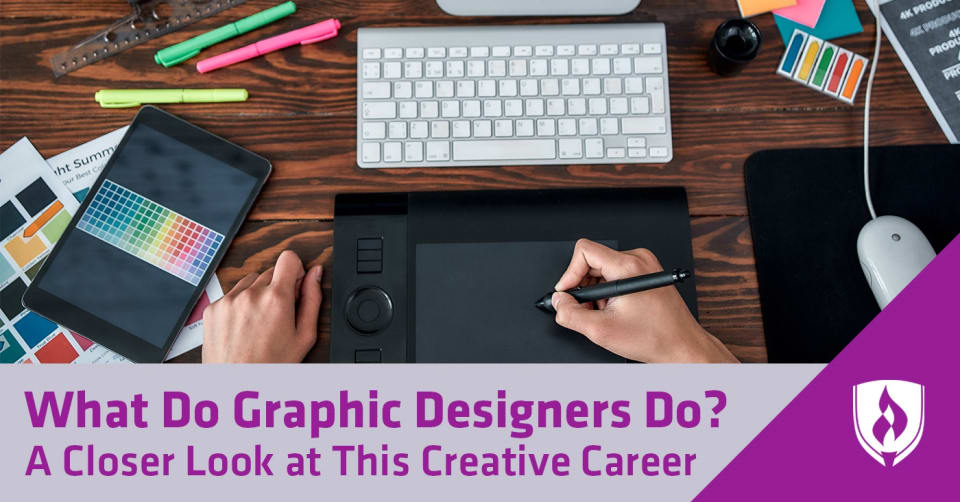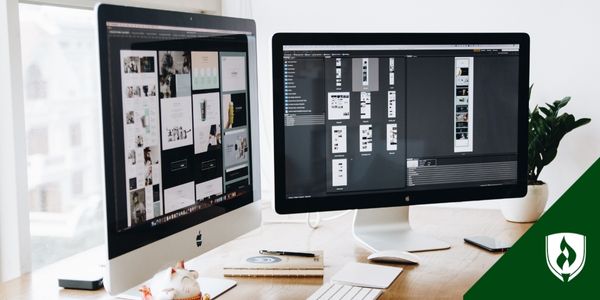
From billboards and product labels to laptops and smartphones, graphics are everywhere. Brands big and small use both printed and digital designs—like logos, websites or advertisements—in an effort to attract the eye of their audience and promote their product or service. And no matter what they’re selling, behind every brand’s visual campaign is a graphic designer.
But what do graphic designers do exactly? Simply put, they create visual concepts, physically or digitally, to communicate ideas that inspire, inform and captivate consumers, according to the Bureau of Labor Statistics (BLS).1
Though all designers have a few things in common, their job duties, work environment and skillsets can vary greatly. But to give you a better understanding, we’re here to give you a closer look at what graphic designers do and how they do it. Also check out is graphic design a good major?
What is graphic design, anyway?
Involving aspects of marketing, art, technology and customer service, graphic design can seem like a complicated concept. To simplify their function, think of graphic designers like visual storytellers. A good designer’s job is to use imagery to tell a story in a way that supports a brand’s message and evokes emotion.
Much of what graphic designers do is to blend form and function, according to graphic designer Pablo Solomon. “As in any good design, you want to accomplish your practical goal in the most visually pleasing and impacting way,” he explains. “Where musicians use music, poets use words and dancers use their movements to communicate feelings, designers use their images.”
At the end of the day, a designer’s aim should be to fulfill their client’s desire to communicate an idea in a visual way.
What does a graphic designer do?
Now that you have a better idea of what graphic designers are responsible for, you’re probably curious about what they do on a daily basis. Keep in mind this can vary greatly depending on where they work and what they specialize in.
But when it comes to what a graphic designer does, there are some general tasks you can expect. Here are some of the daily duties as reported by the BLS.1
Common graphic designer duties1:
- Meeting with clients or art directors to define the scope of a project
- Using photo editing software, layout software and digital illustration to create designs
- Selecting colors, images and typefaces to convey a company’s brand and message
- Presenting design concepts to clients or art director
- Applying updates to designs based on stakeholder feedback and opinion
- Examining final designs to ensure there are no errors before printing or publishing
Where do graphic designers work?
There are three main settings that graphic designers have an opportunity to work in: in-house, agency or freelance. An in-house designer is employed by a company to produce creative materials specifically for their own brand. An agency designer will work on a project-by-project basis for a company who provides creative services for a variety of clients. A freelance designer is self-employed and manages their own workload and clientele.
Each work environment comes with its own advantages and disadvantages, and there are certain qualities and characteristics that are ideal in each setting. It’s important for graphic designers to familiarize themselves with the different options in order to decide which environment best suits them.
What do graphic designers do in an in-house setting?
In-house graphic designers enjoy the stability of a “traditional” work environment. They create designs strictly for the company in which they are employed, allowing them to fully invest in the brand and its target market. A designer in this setting tends to be a “jack of all trades,” having a broad skillset with the ability to take on many different types of projects for their team.
What do graphic designers do in an agency setting?
It is quite common for smaller businesses or individuals to outsource their design work to a graphic design agency. Depending on the size of the projects, agency designers may juggle several projects for different clients in any given week. The workload tends to ebb and flow depending on the contracts that come in, which often makes for inconsistent schedules while working to meet deadlines. Agencies often employ design specialists and disperse the projects accordingly to ensure high quality.
What do graphic designers do in a freelance setting?
For business-savvy and self-disciplined designers, freelancing can be an ideal option. These designers are self-employed and often work from the comfort of their own home. As the person in charge, they have the ability to pick and choose the hours they work, the types of projects they take and the clients they work with. In addition to the design responsibilities, they are also responsible for marketing, finances, operations and other important aspects of their business.
What are some important graphic design skills?
Since their jobs consist of several unique aspects, graphic designers must possess a unique blend of artistic and technical skills. We used real-time job analysis software to examine more than 54,000 graphic designer job postings from the past year.2 The data helped us identify the most important hard and soft skills according to employers.
Top technical skills for graphic designers:2
- Adobe Creative Suite®
- Social media
- Typesetting
- Website design
- Packaging
- Project management
- Visual design
- Marketing materials
- Illustration
- Digital design
Top transferable skills for graphic designers:2
- Creativity
- Communication
- Attention to detail
- Collaboration
- Organization
- Meeting deadlines
- Editing
- Problem solving
- Multi-tasking
- Time management
Are you destined to be a graphic designer?
So what does a graphic designer do? It turns out there is no standard job description. The specific duties are highly dependent upon the work environment and area of specialization.
This is good news for those interested in pursuing the profession, because you can essentially design your own career path—one that aligns with your own preferences and priorities. If that appeals to you, you might want to consider a career as a graphic designer.
Learn more about how to make that a reality in our article, “How to Become a Graphic Designer: Advice from Creative Pros.”
1Bureau of Labor Statistics, U.S. Department of Labor, Occupational Outlook Handbook, [accessed August 2020]. Information represents national, averaged data for the occupations listed and includes workers at all levels of education and experience. This data does not represent starting salaries. Employment conditions in your area may vary.
2Burning-Glass.com (analysis of 54,551 graphic designer job postings, Aug. 01, 2019 – Jul. 31, 2020).
EDITOR’S NOTE: This article was originally published in 2018. It has since been updated to include information relevant to 2020. Insight from Pablo Solomon remains from original.
Adobe Creative Suite is a registered trademark of Adobe, Inc.




